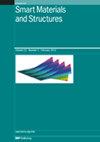Online meta-learning approach for sensor fault diagnosis using limited data
IF 3.8
3区 材料科学
Q1 INSTRUMENTS & INSTRUMENTATION
引用次数: 0
Abstract
The accurate and timely diagnosis of sensor faults plays a critical role in ensuring the reliability and performance of structural health monitoring (SHM) systems. However, the challenge is detecting, locating, and estimating sensor faults in an online manner using limited training data. To resolve this problem, a novel approach for online sensor fault diagnosis is proposed for SHM. The proposed approach is based on meta-learning, which enables superior model generalization capabilities using limited data. The detection, localization, and estimation of typical sensor faults in an online manner can be achieved efficiently by the proposed approach. First, a one-dimensional convolutional neural network (1D CNN) is designed to detect and locate faulty sensors. The initial model parameters of the 1D CNN are optimized using a model-agnostic meta-learning training strategy. This strategy allows the acquisition of transferable prior knowledge, which can speed up the learning process on new sensor fault detection and localization tasks. The meta-learning strategy also enables efficient and accurate detection and localization of potential faulty sensors with limited data. After detecting and locating the faulty sensors, an online updating algorithm based on a dual Kalman filter is used to estimate the severity of sensor faults and structural states simultaneously. The proposed approach is demonstrated with simulated sensor faults that cover a numerical example and field measurements from the Canton Tower. The results show that the proposed approach is applicable for online sensor fault diagnosis in SHM.利用有限数据进行传感器故障诊断的在线元学习方法
准确及时地诊断传感器故障对于确保结构健康监测(SHM)系统的可靠性和性能起着至关重要的作用。然而,利用有限的训练数据在线检测、定位和估计传感器故障是一项挑战。为解决这一问题,我们提出了一种用于 SHM 的在线传感器故障诊断新方法。该方法基于元学习,能利用有限的数据实现卓越的模型泛化能力。该方法可以高效地实现典型传感器故障的在线检测、定位和估计。首先,设计了一维卷积神经网络(1D CNN)来检测和定位故障传感器。一维卷积神经网络的初始模型参数采用模型无关的元学习训练策略进行优化。该策略允许获取可转移的先验知识,从而加快新传感器故障检测和定位任务的学习过程。元学习策略还能在数据有限的情况下高效、准确地检测和定位潜在的故障传感器。在检测和定位故障传感器后,基于双卡尔曼滤波器的在线更新算法可同时估计传感器故障的严重程度和结构状态。我们用模拟传感器故障的数值示例和广州塔的实地测量结果对所提出的方法进行了演示。结果表明,所提出的方法适用于 SHM 中的在线传感器故障诊断。
本文章由计算机程序翻译,如有差异,请以英文原文为准。
求助全文
约1分钟内获得全文
求助全文
来源期刊

Smart Materials and Structures
工程技术-材料科学:综合
CiteScore
7.50
自引率
12.20%
发文量
317
审稿时长
3 months
期刊介绍:
Smart Materials and Structures (SMS) is a multi-disciplinary engineering journal that explores the creation and utilization of novel forms of transduction. It is a leading journal in the area of smart materials and structures, publishing the most important results from different regions of the world, largely from Asia, Europe and North America. The results may be as disparate as the development of new materials and active composite systems, derived using theoretical predictions to complex structural systems, which generate new capabilities by incorporating enabling new smart material transducers. The theoretical predictions are usually accompanied with experimental verification, characterizing the performance of new structures and devices. These systems are examined from the nanoscale to the macroscopic. SMS has a Board of Associate Editors who are specialists in a multitude of areas, ensuring that reviews are fast, fair and performed by experts in all sub-disciplines of smart materials, systems and structures.
A smart material is defined as any material that is capable of being controlled such that its response and properties change under a stimulus. A smart structure or system is capable of reacting to stimuli or the environment in a prescribed manner. SMS is committed to understanding, expanding and dissemination of knowledge in this subject matter.
 求助内容:
求助内容: 应助结果提醒方式:
应助结果提醒方式:


